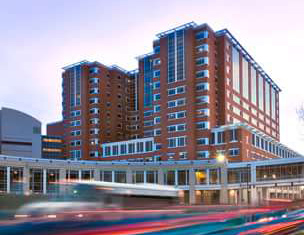Sixty years ago today, the Albert B. Chandler Hospital at the University of Kentucky opened its doors and welcomed its first patients. The hospital has evolved into the UK HealthCare system, operating three hospitals – UK Chandler, UK Good Samaritan and UK Kentucky Children’s Hospital – serving more than 40,000 patients a year.
“This team is dedicated to providing the most advanced, high-quality patient care to Kentucky and beyond,” said Dr. Mark F. Newman, UK’s executive vice president for health affairs.
Access to quality health care in the Bluegrass region is something that is often taken for granted, but that hasn’t always been the case. In the early 20th century, one of every three Kentuckians examined for military service during World War II was deemed medically unfit for duty. In 1949, there were more than 5,000 unattended births in Kentucky and the state ranked near the bottom in physician-to-patient ratio, with an estimated 1,400 additional doctors needed.
In the early 1950s, a group of UK professors and the Legislative Research Commission recommended that an academic medical center be built at UK to improve health-care access for Kentuckians. The state’s only medical school was at the University of Louisville.
In 1954, UK trustees committed to fulfilling the university’s original charter to create a medical college and associated medical center once funds became available. During his 1955 campaign for a second, nonconsecutive term as governor, Albert B. “Happy” Chandler promised that he would get it done, and the university named it for him.
The hospital immediately became a cornerstone for educating top physicians, providing outstanding health care, and conducting breakthrough medical research. It and the rest of UK HealthCare have become a statewide hub for advanced care. Chandler Hospital is a Level 1 trauma center and has one of the largest intensive-care units in Kentucky. During the Covid-19 pandemic, the hospital and UK HealthCare played a critical role, caring for more than 4,400 patients.
“During our anniversary celebration of the opening of UK Chandler Hospital, it is vital that we honor those who came before us and worked diligently on what was merely a vision of health-care access in the 1950s and ’60s,” Newman said. “We are forever grateful for those who provided the support needed to build the foundation that has led to our world-class medical facilities. It is our hope that through our work, we honor the legacy of these visionaries and leaders each and every day.”
